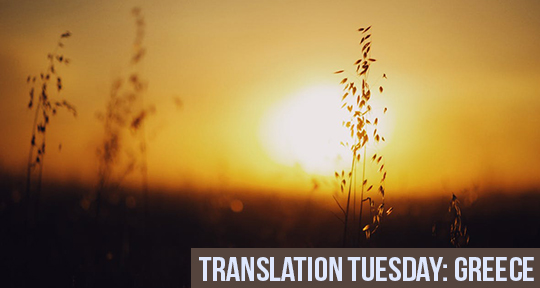“She was confirming her existence through pain.” With these words, Greek writer Evgenia Bogianou vividly illustrates the mind of her unnamed narrator, a small girl playing a field at the edge of town, only moments away from witnessing an encounter that will mark her for the rest of her life. Watching a man from her village make love to an unknown woman, the injured girl begins to discern the pain inherent to all desire, the wound in her knee giving way to the lifelong wound of love itself, ever present and impossible to satisfy. Rendered here in a luminous translation by Gina Scarpete Walters, this story is sure to leave you, like its narrator, caught in an impossible position: wanting to persist in a moment that must surely end. Read on!
Ν. was playing in the empty lot. She had scraped her knee, fresh blood on top of the scab. Her hand rebelliously scratched the wound. She felt pleasure from it even though she was in pain. Sometimes, the wound hurt so much that she felt the pain all the way to her head. N. wasn’t worried. She made sure that her body, her knee and everything else was hers, that’s why they hurt. She was confirming her existence through pain, despite the fact that the only thing she was doing was scratching the wound.
The empty lot was just outside the village, in an uninhabited area. If she could, N. would stay there until dawn, scraped knee and all. It was spacious there. In the village, everything was cramped—voices could be heard, the roofs were low and hung to the ground, cutting off the air, cutting off the light. But in the empty lot, the light was abundant. In the afternoons, the light fell sideways on the low fields of grass. In those moments, the grass ceased to be grass and the light, unimaginably brilliant, ceased to be light; it became something else.
N. sat on a low rock with her hand on the wound, the fresh blood adding a red intensity to the crimson of the original scab. When she saw people coming, she crouched down, becoming an indistinguishable shadow amid the shadows. The man was Mimis, and she didn’t know the woman. She had seen her two or three times in the square. Her face was white, translucent. Her eyes, small and insatiable, gazed knowingly at N. for a moment. But she knew nothing.
Mimis and the woman laid on the ground. The glow of the grass faded, reverting to its true reality. They touched, their bodies no longer seeming foreign to one another. N.’s gaze fell on them like an intruding stranger. Her hand on the wound picked at the fresh blood over the scab; her uninvited stare, just as wounded, looked down upon the unfamiliar, entwined bodies that claimed the waning light of the afternoon. The light connected them, it created a bridge—the luminous woman became more radiant. Mimis appeared more of himself than ever. His darker complexion carried with it the memory of each Mimis from throughout her life that later. . .
But now it’s a summer afternoon. The lot outside the village was quiet; the light, abundant. The two strange bodies are lying down on the ground as one; the strange look of N. is upon them. An unknown look can do a lot, even set fire.
The fire burns within N. It burns without guilt in the wounded body. Only the light is to blame.
The unassailable light over the strange, unassailable, entwined bodies. The bridge that connects. The memory that has not yet become a memory. The dusky, eternal, unassailable Mimis of her life.
N. puts her hand into the wound, deep, as deep as she can, until it touches bone.
Translated from the Greek by Gina Scarpete Walters
Evgenia Bogianou was born in 1968 in Thessaloniki and lives in Athens, Greece. She has published several collections of short stories, including Mystiko (Ροές/Roes Publications, 2004) and Kleisti Porta (Πόλις/Polis Publications, 2012), among others. In 2014, her novel Akoma Fevgi was published by Πόλις/Polis Publications. She actively contributes to the newspaper Avgi, where she publishes book reviews. Her most recent short story book, Aftes (Polis, 2022), was shortlisted for the Anagnostis Best Short Story Collection Award 2023.
Gina Scarpete Walters has a Ph.D. in Comparative Culture and Language (Linguistics) from Arizona State University. Her research interests lie primarily in cognitive and cultural linguistics, translation studies, and languages of the Balkans (Albanian, Greek, and Romanian). She holds two M.A. degrees from the University of Bucharest (Romania), one in Advanced Studies in Linguistics and another in Translation Studies. She did a one-year internship in literary translation with the Thousand Languages Project from the Virginia G. Piper Center for Creative Writing at Arizona State University, a dynamic, multilingual translation project and database, where she translated and published literary pieces from English to Modern Greek and Romanian. In 2023, she was one of the participants in the Fifth Workshop in Literary Translation (Modern Greek to English) organized by Peter Constantine (University of Connecticut) and Karen Emmerich (Princeton University) at the Seeger Center for Hellenic Studies, Princeton University.

